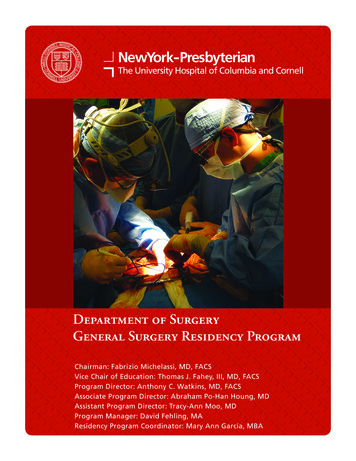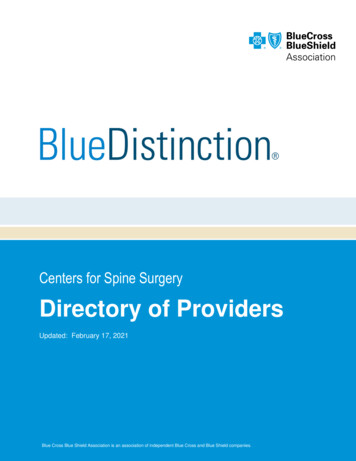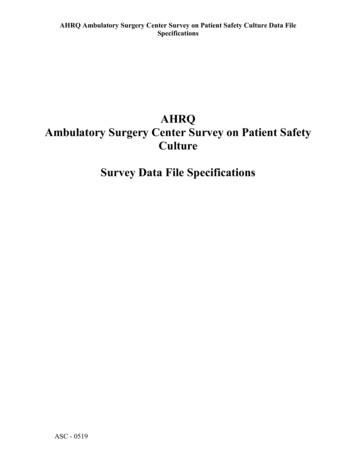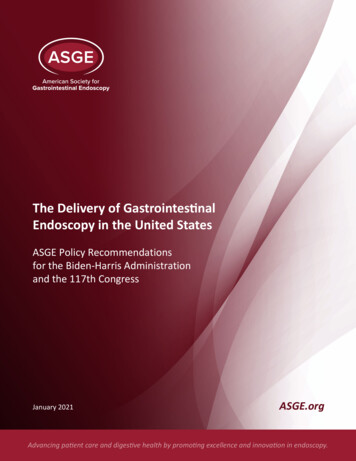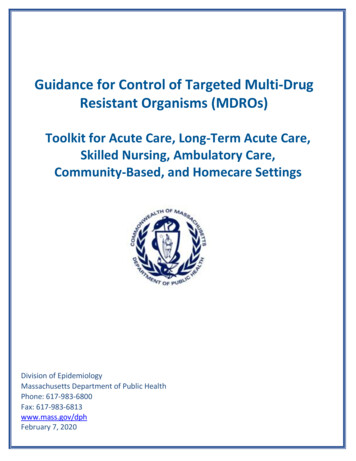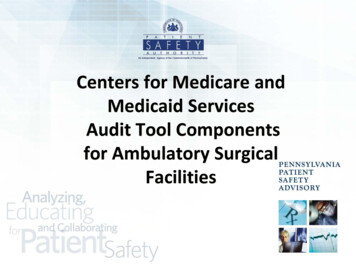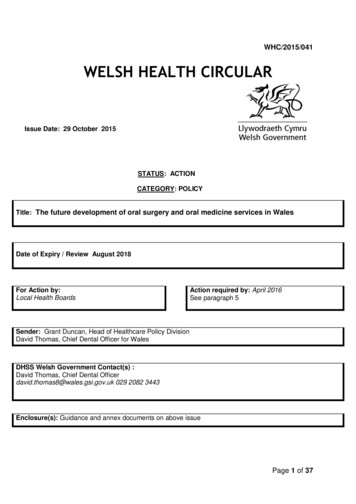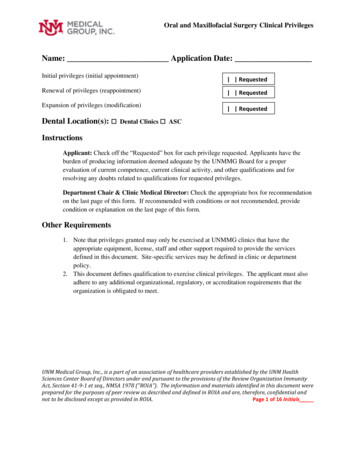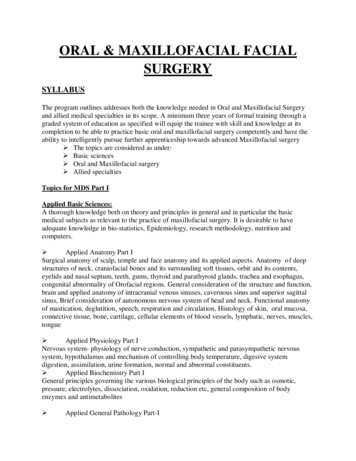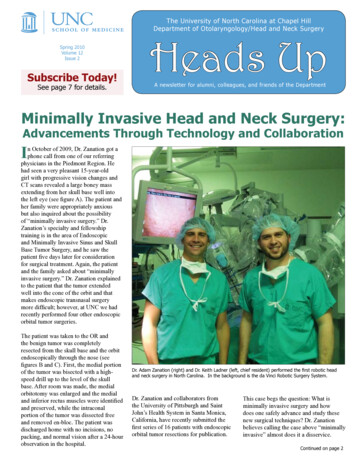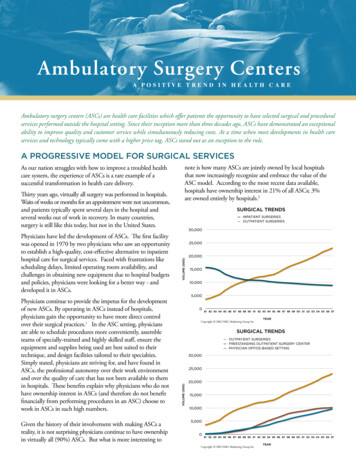
Transcription
AMBULATORY SURGERY CENTERS: A POSITIVE TREND IN HEALTH CARE Ambulatory Surgery CentersA P O S I T I V E T R E N D I N H E A LT H C A R EAmbulatory surgery centers (ASCs) are health care facilities which offer patients the opportunity to have selected surgical and proceduralservices performed outside the hospital setting. Since their inception more than three decades ago, ASCs have demonstrated an exceptionalability to improve quality and customer service while simultaneously reducing costs. At a time when most developments in health careservices and technology typically come with a higher price tag, ASCs stand out as an exception to the rule.A Progressive Model for Surgical ServicesAs our nation struggles with how to improve a troubled healthcare system, the experience of ASCs is a rare example of asuccessful transformation in health care delivery.Thirty years ago, virtually all surgery was performed in hospitals.Waits of weeks or months for an appointment were not uncommon,and patients typically spent several days in the hospital andseveral weeks out of work in recovery. In many countries,surgery is still like this today, but not in the United States.note is how many ASCs are jointly owned by local hospitalsthat now increasingly recognize and embrace the value of theASC model. According to the most recent data available,hospitals have ownership interest in 21% of all ASCs; 3%are owned entirely by hospitals.2Physicians have led the development of ASCs. The first facilitywas opened in 1970 by two physicians who saw an opportunityto establish a high-quality, cost-effective alternative to inpatienthospital care for surgical services. Faced with frustrations likescheduling delays, limited operating room availability, andchallenges in obtaining new equipment due to hospital budgetsand policies, physicians were looking for a better way - anddeveloped it in ASCs.Physicians continue to provide the impetus for the developmentof new ASCs. By operating in ASCs instead of hospitals,physicians gain the opportunity to have more direct controlover their surgical practices.1 In the ASC setting, physiciansare able to schedule procedures more conveniently, assembleteams of specially-trained and highly skilled staff, ensure theequipment and supplies being used are best suited to theirtechnique, and design facilities tailored to their specialties.Simply stated, physicians are striving for, and have found inASCs, the professional autonomy over their work environmentand over the quality of care that has not been available to themin hospitals. These benefits explain why physicians who do nothave ownership interest in ASCs (and therefore do not benefitfinancially from performing procedures in an ASC) choose towork in ASCs in such high numbers.Copyright 2002 SMG Marketing Group IncGiven the history of their involvement with making ASCs areality, it is not surprising physicians continue to have ownershipin virtually all (90%) ASCs. But what is more interesting toCopyright 2002 SMG Marketing Group Inc
AMBULATORY SURGERY CENTERS: A POSITIVE TREND IN HEALTH CARE 2004 ASC Salary and Benefits Survey, FederatedAmbulatory Surgery Association, 2004.ASCs ALLOW PHYSICIANS TO WORK EFFICIENTLYA recent analysis examined the impact of the agingpopulation on the demand for surgical procedures andattendant need for surgical subspecialists. This studyconcluded that the aging population would be a majorforce in driving significant growth in the demand forsurgical services. The forecasted growth in work by the year2020 varied from 14 percent to 47 percent, depending onspecialty.3 Meeting these surgical needs will be a challenge.Solutions include increasing the number of surgicalresidency positions, increasing the workloads of surgeons inthe workforce, and improving the efficiency of surgeons.Utilizing settings that allow physicians to practice efficientlywill help mitigate the impact of the aging population onthe anticipated shortage in the surgery workforce. ASCsoffer physicians the ability to work more efficiently and aretherefore uniquely positioned to play an important role inmanaging the increased need for surgical services as it arisesin the years ahead.Etzioni DA, Liu JH, Maggard MA, Ko CY. The aging population and its impact on the surgery workforce. Ann Surg. 2003 Aug;238(2):170-7.
AMBULATORY SURGERY CENTERS: A POSITIVE TREND IN HEALTH CARE ASCS ARE HIGHLY REGULATED TO ENSURE QUALITY AND SAFETYHealth care facilities in the United States are highly regulatedby federal and state entities. ASCs are not excluded from thisoversight.The safety and quality of care offered in ASCs is evaluated byindependent observers through three processes: state licensure,Medicare certification and voluntary accreditation.Most states require ASCs to be licensed in order to operate.Each state determines the specific requirements ASCs mustmeet for licensure. Most state licensure programs requirerigorous initial and ongoing inspection and reporting.All ASCs serving Medicare beneficiaries must be certified bythe Medicare program. In order to be certified, an ASC mustcomply with standards developed by the federal governmentfor the specific purpose of ensuring the safety of the patientand the quality of the facility, physicians, staff, servicesand management of the ASC. The ASC must demonstratecompliance with these Medicare standards initially andon an ongoing basis.In addition to state and federal inspections, many ASCs chooseto go through voluntary accreditation by an independentaccrediting organization. Accrediting organizations forASCs include the Joint Commission on Accreditation ofHealthcare Organizations (JCAHO), the AccreditationAssociation for Ambulatory Health Care (AAAHC), theAmerican Association for the Accreditation of AmbulatorySurgery Facilities (AAAASF) and the American OsteopathicAssociation (AOA). ASCs must meet specific standardsduring on-site inspections by these organizations in order tobe accredited. All accrediting organizations require an ASC toengage in external benchmarking, which allows the facility tocompare its performance to the performance of other ASCs.In addition to requiring certification in order to participatein the Medicare program, federal regulations also limit thescope of surgical procedures reimbursed in ASCs.5 Generally,services are limited to elective procedures with short anesthesiaand operating times not requiring an overnight stay. Theselimitations do not apply to hospital outpatient departments(HOPDs).6an ambulatory patient who is discharged home immediatelythereafter. In other words, ambulatory patients seen onan outpatient basis in an HOPD may utilize exactly thesame facilities used to provide services to patients who havebeen admitted to the hospital. Consequently, the inpatientstandards for hospitals are applied to HOPDs.7On the other hand, ASCs provide services in facilitiesspecifically designed to perform selected outpatient surgicalservices. The different requirements developed by the federalgovernment appropriately reflect the fundamental differencesin the hospital setting versus the ASC.8ASCs consistently perform as well as, if not better than,HOPDs when quality and safety is examined. A recent study9included an examination of the rates of inpatient hospitaladmission and death in elderly patients following commonoutpatient surgical procedures in HOPDs and ASCs. Ratesof inpatient hospital admission and death were lower infreestanding ASCs as compared to HOPDs. Even aftercontrolling for factors associated with higher-risk patients,ASCs had low adverse outcome rates.Fleisher LA, Pasternak LR, Herbert R, Anderson GF. Inpatient hospital admission and death after outpatient surgery in elderlypatients: importance of patient and system characteristics and location of care. Arch Surg. 2004 Jan;139(1):67-72.The federal government views ASCs and HOPDs as distincttypes of providers. As a result, the federal regulations governingHOPDs and ASCs differ. Another reason for differingregulations is that, in a hospital, the same operating roommay be used interchangeably to provide services to bothinpatients and outpatients. For example, a procedure roomin the HOPD may be used to perform a service for aninpatient and then used to perform the same procedure forFleisher LA, Pasternak LR, Herbert R, Anderson GF. Inpatient hospital admission and death after outpatient surgery in elderlypatients: importance of patient and system characteristics and location of care. Arch Surg. 2004 Jan;139(1):67-72.
AMBULATORY SURGERY CENTERS: A POSITIVE TREND IN HEALTH CARE SPECIFIC FEDERAL REQUIREMENTS GOVERNING ASCSIn order to participate in the Medicare program, ASCs arerequired to meet certain conditions set by the federal governmentdesigned to ensure the facility is operated in a manner thatensures the safety of patients and the quality of services. Someof these requirements are highlighted in more detail below.ASCs are required to maintain complete, comprehensive andaccurate medical records. The content of these records mustinclude a medical history and physical examination relevantto the reason for the surgery and the type of anesthesia planned.In addition, a physician must examine the patient immediatelybefore surgery to evaluate the risk of anesthesia and the procedureto be performed. Prior to discharge each patient must beevaluated by a physician for proper anesthesia recovery.CMS requires ASCs to ensure patients do not acquireinfections during their care at these facilities. ASCsmust establish a program for identifying and preventinginfections, maintaining a sanitary environment, andreporting outcomes to appropriate authorities. The programmust be one of active surveillance and include specificprocedures for prevention, early detection, control, andinvestigation of infectious and communicable diseases inaccordance with the recommendations of the Centers forDisease Control. In fact, ASCs have historically had verylow infection rates.10A registered nurse trained in the use of emergencyequipment and in cardiopulmonary resuscitation mustbe available whenever a patient is in the ASC. To furtherprotect patient safety, ASCs are also required to have aneffective means of transferring patients to a hospital foradditional care in the event an emergency occurs. Writtenguidelines outlining arrangements for ambulance servicesand transfer of medical information are mandatory. An ASCmust have a written transfer agreement with a local hospital,or all physicians performing surgery in the ASC must haveadmitting privileges at the designated hospital. Althoughthese safeguards are in place, hospital admissions as a resultof complications following ambulatory surgery are rare.9,11Continuous quality improvement is an important meansof assuring patients are receiving the best care possible.ASCs are required to implement and monitor policiesthat ensure the facility provides quality health care in asafe environment. An ASC, with the active participationof the medical staff, is required to conduct an ongoing,comprehensive assessment of the quality of care provided.The excellent outcomes associated with ambulatory surgeryreflect the commitment that the ASC industry has madeto quality and safety. One of the many reasons that ASCscontinue to be so successful with patients, physicians andinsurers is their keen focus on ensuring the quality of theservices provided.Medicare Requirements for ASCs and HospitalsAre The Same Where Services are ComparableRequired StandardsCompliance with state licensure lawGoverning bodySurgical servicesEvaluation of qualityEnvironmentMedical staffNursing servicesMedical recordsPharmaceutical servicesLaboratory servicesRadiologic servicesASCrrrrrrrrrrrHospitalrrrrrrrrrrrSource: 42 CFR 416, 42 CFR 482THE ASC INDUSTRY IS COMMITTEDTO REPORTING QUALITY MEASURESA fundamental change in the way the government assuresthe quality of health care services is well underway. TheDepartment of Health and Human Services has launchedits Quality Initiative to assure quality health care throughaccountability and public disclosure.The ASC industry is excited to have the opportunity to makeits excellent outcomes more widely known to the publicthrough this initiative. Leaders from the ASC industry, alongwith associations and related organizations with a focus onhealth care quality and safety, have come together in acollaborative effort to identify specific measures forquality appropriate to ASCs. This group, the ASC QualityCollaboration, strongly endorses the vision that measures ofquality which are appropriate to ASCs should be congruentwith measures utilized for other outpatient surgery settings.The continued development of these measures will involvea number of different stakeholders including ASC clinicaland administrative leaders, health policy researchers, CMSand other key federal and state governmental agencies. Thegroup will also work with the National Quality Forum toachieve consensus on the proposed quality measures.PATIENT SATISFACTIONPatient satisfaction is a hallmark of the ASC industry. This year,more than eight million Americans will undergo surgery in an ASC.Virtually all of those patients will return home the same day andwill resume most normal activities within a matter of days. Talkto these patients and you will hear how overwhelmingly satisfiedthey are with their ASC experience. Recent surveys show averagepatient satisfaction levels in ASCs exceeding 90 percent.4 Safe andhigh quality services, ease of scheduling, greater personal attentionand lower costs are among the main reasons cited for the growingpopularity of ASCs as a place for having surgery.
AMBULATORY SURGERY CENTERS: A POSITIVE TREND IN HEALTH CARE ASCs Provide care at significant cost savingsNot only are ASCs focused on ensuring patients have thebest surgical experience possible, the care they provide isalso more affordable. One of the reasons ASCs have beenso successful is they offer valuable surgical and proceduralservices at a lower cost when compared to hospital chargesfor the same services. Beginning in 2007, Medicarepayments to ASCs will be lower than or equal to Medicarepayments to HOPDs for comparable services for 100percent of procedures.12In addition, patients typically pay less coinsurance forprocedures performed in the ASC than for comparableprocedures in the hospital setting. For example, a Medicarebeneficiary could pay as much as 496 in coinsurance fora cataract extraction procedure performed in a HOPD,whereas that same beneficiary’s copayment in the ASCwould be only 195; a Medicare beneficiary could pay asmuch as 186 in coinsurance for a colonoscopy performedin a HOPD, whereas that same beneficiary’s copayment forthe same procedure performed in an ASC would be only 89. By having surgery in the ASC the patient may save asmuch as 61%, or more than 300, compared to their out-ofpocket coinsurance for the same procedure in the hospital.Without the emergence of ASCs as an option for care, healthcare expenditures would have been billions of dollars higherover the past three decades. Studies have shown the Medicareprogram would pay approximately 464 million more peryear if all procedures performed in an ASC were insteadfurnished at a hospital.13 Private insurance companies tendto save similarly, which means employers also incur lowerhealth care costs by utilizing ASC services. Employers andinsurers, particularly managed care entities, are driving ASCgrowth in many areas, because they recognize ASCs are ableto deliver consistent, high quality outcomes at a significantsavings. As the number of surgical procedures performed inASCs grows, the Medicare program may realize even greatersavings - and of course Medicare beneficiaries will realizeadditional out-of-pocket savings as well.13MedPAC, Report to the Congress: Medicare Payment Policy, March 2004.THe ASC industry supports disclosure of pricing informationIt is the general practice of ASCs to make pricinginformation available to the patient in advance of surgery.The industry is eager to make price transparency a reality,not only for Medicare beneficiaries, but for all patients. Tooffer maximum benefit to the consumer, these disclosuresshould outline the total price of the planned surgicalprocedure and the specific portion for which the patientwould be responsible. This will empower health careconsumers as they evaluate and compare costs for the sameservice amongst various health care providers.
AMBULATORY SURGERY CENTERS: A POSITIVE TREND IN HEALTH CARE ASCs Improve Patient Choice, Demand for ASCs GrowsTechnological advancement has allowed a growing rangeof procedures to be performed safely on an outpatientbasis. Faster acting and more effective anesthetics and lessinvasive techniques, such as arthroscopy, have driven thisoutpatient migration. Procedures that only a few yearsago required major incisions, long-acting anesthetics andextended convalescence can now be performed throughclosed techniques utilizing short-acting anesthetics, and withminimal recovery time. As medical innovation continuesto advance, more and more procedures will be able to beperformed safely in the outpatient setting.The number of ASCs continues to grow in response todemand from the key participants in surgical care – patients,physicians and insurers. This demand has been madepossible by technology, but has been driven by high levels ofpatient satisfaction, efficient physician practice, high levelsof quality and the cost savings that have benefited all. Thenumber of Medicare certified ASCs has grown from 2786 in1999 to 4506 in 2005, with an average annual growth rateof 8.3%.14Further impetus to future ASC growth has been givenby MedPAC, which has recommended that the CMS listof approved ASC procedures be expanded. This wouldASCS WILL CONTINUE TO LEADINNOVATION IN OUTPATIENTSURGICAL CAREAs leaders of the revolution in surgical care who led to the establishment of affordable and safe outpatient surgery, the ASCindustry has shown itself to be ahead of the curve in identifyingpromising avenues for improving the delivery of health care.With a solid track record of performance in stakeholder satisfaction, safety, quality and cost management, the ASC industryis already embracing the changes that will allow it to continueto play a leading role in raising the standards of performance inthe delivery of outpatient surgical services.As always, the ASC industry welcomes any opportunity toclarify the services it offers, the regulations and standardsgoverning its operations, and the ways in which it ensures safe,high-quality care for patients.MedPAC, Data Book, June 2006.allow a broader range of choice for patients and surgeons.Specifically, MedPAC has recommended the proceduresapproved for the ASC setting be revised so that ASCscan receive payment for any surgical procedure, with theexception of those surgeries requiring an overnight stay orwhich pose a significant safety risk when furnished in anASC.8 Adoption of these recommendations would allowMedicare beneficiaries to access an extended range of surgicalservices – a range of surgical services which is alreadyavailable to patients with private insurance.15POLICY CONSIDERATIONSGiven the continued fiscal challenges posed by administeringhealth care programs, policy makers and regulators shouldcontinue to focus on fostering innovative methods of healthcare delivery that offer safe, high-quality care so progressivechanges in the nation’s health care system can be implemented.Support should be reserved for those policies that promotethe utilization of sites of service providing more affordablecare while maintaining high quality and safety standards. Inlight of the many benefits ASCs have brought to the nation’shealth care system, it will be important for future paymentand coverage policies to continue to strengthen access to andutilization of ASCs.
ENDNOTESAMBULATORY SURGERY CENTERS: A POSITIVE TREND IN HEALTH CARE 71 “Ambulatory Surgery Centers.” Encyclopedia of Surgery. Ed. Anthony J. Senagore. Thomson Gale, 2004.2 2004 ASC Salary and Benefits Survey, Federated Ambulatory Surgery Association, 2004.3 Etzioni DA, Liu JH, Maggard MA, Ko CY. The aging population and its impact on the surgery workforce. Ann Surg.2003 Aug;238(2):170-7.4 Press Ganey Associates, 2004.5 Centers for Medicare and Medicaid Services ASC Website, http://www.cms.hhs.gov/center/asc.asp6 70 Fed. Reg. pp.68916-68964, November 10, 2005.7 42 C.F.R. §4828 42 C.F.R. §4169 Fleisher LA, Pasternak LR, Herbert R, Anderson GF. Inpatient hospital admission and death after outpatient surgery in elderlypatients: importance of patient and system characteristics and location of care. Arch Surg. 2004 Jan;139(1):67-72.10 FASA, FASA Outcomes Monitoring Project, 4th Quarter 200511 Natof HE. Complications associated with ambulatory surgery. JAMA. 1980 Sep 5;244(10):1116-8.12 Deficit Reduction Act of 2005.13 MedPAC, Report to the Congress: Medicare Payment Policy, March 2004.14 MedPAC, Data Book, June 2006.15 Thomson Medstat, MarketScan Outpatient Claims Data, 2005.This report was prepared by the ASC Coalition and is further supported by the following organizations:Alabama Ambulatory Surgery AssociationAmerican Association of Ambulatory Surgery CentersAmSurgArizona Ambulatory Surgery Center AssociationArkansas Ambulatory Surgery AssociationCalifornia Ambulatory Surgery AssociationColorado Ambulatory Surgery Center AssociationFASAFlorida Society of Ambulatory Surgical CentersFoundation for Ambulatory Surgery in AmericaFreestanding Ambulatory Surgery Center Association of TennesseeGeorgia Society of Ambulatory Surgery CentersHealthmark Industries CoHealthSouthIdaho Ambulatory Surgery Center AssociationIllinois Freestanding Surgery Center AssociationIndiana Federation of Ambulatory Surgical CentersKansas Association of Ambulatory Surgery Centers
AMBULATORY SURGERY CENTERS: A POSITIVE TREND IN HEALTH CARE 8Kentucky Ambulatory Surgery Center AssociationMaine Ambulatory Surgery Center CoalitionMaryland Ambulatory Surgical AssociationMississippi Ambulatory Surgery AssociationMissouri Ambulatory Surgery Center AssociationNational Surgical CareNevada Ambulatory Surgery AssociationNew Hampshire Ambulatory Surgical AssociationNovaMedOhio Association of Ambulatory Surgery CentersPennsylvania Ambulatory Surgery AssociationSouth Carolina Ambulatory Surgery Center AssociationSouth Dakota Association of Specialty Care ProvidersSymbion HealthcareTexas Ambulatory Surgery Center SocietyUnited Surgical Partners InternationalUtah Ambulatory Surgery Center AssociationWashington Ambulatory Surgery Center AssociationProvided to You Courtesy ofThe American Society for Gastrointestinal EndoscopyFor information, call Randy Fenninger at 202.833.0007
2004 ASC Salary and Benefits Survey, Federated Ambulatory Surgery Association, 2004. Etzioni DA, Liu JH, Maggard MA, Ko CY. The aging population and its impact on the surgery workforce. . A registered nurse trained in the use of emergency equipment and in cardiopulmonary resuscitation must be available whenever a patient is in the ASC. To further
